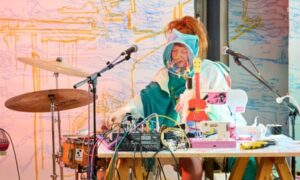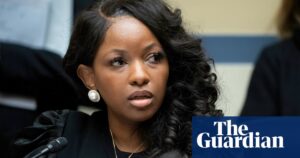We are in the run-up to the release of Bong Joon Ho’s latest, Mickey 17, and Warner Bros has got the Oscar-winning Korean director stashed away in what appears to be some kind of basement storage room, with grey-painted brickwork and exposed wiring. In fact, this room could pass for one of the “gritty and kind of nasty” cargo-container-packed cabins of his film’s spaceship setting.
Not that anyone is complaining. Bong, who speaks good English but prefers to conduct interviews via his longtime interpreter Sharon Choi, appears cheerful throughout our conversation, taking occasional sips from a takeaway coffee cup, while dressed in his usual arthouse auteur uniform of a slate-grey blazer over a black T-shirt. He is, for example, completely sanguine about the fact that this follow-up to 2019’s Parasite is only now reaching our screens, 12 months after its slated release date. Mickey 17 wasn’t the only production delayed by 2023’s Screen Actors Guild strikes, he points out, and besides: “My films are quite complicated in terms of distributing and marketing. It’s hard to pinpoint exactly how to package and when to release, because it’s a mix of so many different genres.”
That is certainly true of Mickey 17, which might best be described as a blackly comic, satirical sci-fi-crime caper. It stars Robert Pattinson as the dopey and desperate Mickey Barnes, who signs up to work a dangerous job on a space-colonising mission, led by a despotic ex-congressman (Mark Ruffalo) and his unhinged wife (Toni Colette). Then, whenever one of Mickey’s assignments results in his death – which is often – he is simply cloned, using “reprinting” technology and sent straight back to work. This is a notion Bong seems to find particularly discomfiting. “Y’know, there’s an HP printer right here in this room, as we’re doing this interview,” he says, eyeing the machine warily. “To think that, like, my head and my arms and legs would just be printed out of this printer, like a piece of paper …”
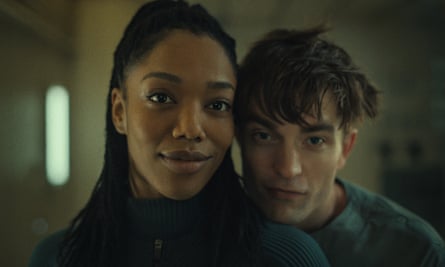
Considering Mickey 17 originated as an unpublished novel manuscript, optioned by Warner Bros – “The first time I accepted an offer that came to me,” Bong notes – it’s impressive how seamlessly another writer’s ideas have been absorbed into the director’s own creative sensibility. The mission, to the distant planet of Niflheim, is beset by plenty of Parasite-esque upstairs-downstairs discord: there’s a noirish, serial-killer subplot reminiscent of Bong’s breakthrough feature, Memories of Murder (2003), and Niflheim itself is a frozen dystopian landscape, just like that in 2013’s Snowpiercer, and populated by a species of creepy-cute beasts, not dissimilar from the title character in 2017’s Okja.
None of those previous films were made with the benefit of the three Academy Awards wins Bong has to his name, however. Parasite was a Hitchcockian class-war thriller of such elegant construction that even the notoriously parochial Hollywood establishment couldn’t ignore the achievement. After collecting the Palme d’Or at Cannes, it made history as the first non-English language film to win the Oscar for best picture, positioning Bong at the forefront of Korea’s current wave of international cultural influence, alongside the Netflix TV hit Squid Game and K-pop stars BTS and Blackpink. When I ask how this has changed his experience of film-making, he fixes eye contact and declares – in English, for added effect – “It changes nothing.” OK, he later clarifies, the Oscars probably did help raise Mickey 17’s budget and ease along the casting process, particularly with regards to securing participation of Pattinson. “He was truly the nucleus of this story,” Bong says, “I can’t even imagine this film without Rob. I’m also quite proud of myself for thinking of him for this role.” He feels similarly about the casting of another Briton, Blink Twice’s Naomi Ackie, as Nasha, the one bright spot in Mickey’s otherwise wretched, expendable existence. “Without Nasha’s strength, this film would be so much more difficult to watch … And Naomi was the perfect actor for that. There’s a sense of purity in her eyes.”
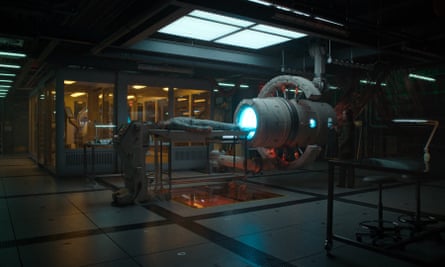
But don’t these bigger budgets (Mickey 17 reportedly cost more than 10 times as much as Parasite) and higher profile, international casts also come with added pressure? Not really, says Bong: “The biggest thing [during production] was, as I’m getting older, I feel a bit weaker, and my stamina is not as strong, so I have to fight against my ageing body and mind.” He chuckles, shrugs and then adds, in English: “The middle-aged film-maker.”
Bong will turn 56 in September, so he is, I suggest, but a babe in arms compared with still-active, octogenarian film-makers such as Mike Leigh and Ken Loach. The mention of these names seems to instantly take another 10 years off him: “I’ve always been inspired so much by Mike Leigh,” he says, sitting forwards in his chair. “I love his films – Naked, Secrets & Lies – particularly with his working-class characters and how lived-in they seemed. And I met Ken Loach in France a couple years ago, and he had so much energy.” He laughs again. “I wish I could take after them, but, y’know, I’m already just thinking about nap time.”
The British social realists might not seem an obvious point of comparison for Bong Joon Ho, but his films do share a committed interest in inequality and the ordinary working stiff. In Mickey 17, the title character starts out with “this sort of dopey side to him that doesn’t reflect his reality”; then, as the story progresses, he experiences a dawning class consciousness: “He gets the chance to reflect on what it means to be repeatedly ‘reprinted’. And in that sense, you can say that Mickey 17 is a coming-of-age film.”
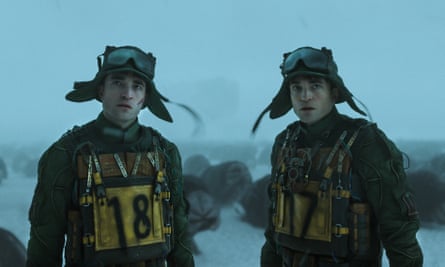
Bong Joon Ho himself came of age in a “relatively stable, middle-class family” in the Jamsil-dong neighbourhood of Seoul, where his father was a graphic designer and art professor, and his mother a homemaker. He was still a schoolboy in 1979 when Major General Chun Doo-hwan took power, and had just begun a sociology degree at Seoul’s Yonsei University by the time he was deposed. South Korea experienced an echo of this era last December, when President Yoon Suk Yeol attempted to declare martial law during a television address. Bong was among the 3,000 members of the Korean film industry who signed a letter in protest. Today, he summarises the effect of political turmoil on his work by explaining that the class divide grows wider under an oppressive military dictatorship. “And so, because I spent my most sensitive years in that environment, naturally I just internalised those issues. It’s not like, when I write a script, I open up my laptop and I have, like, the activist’s headband on …” Here, he mimes tying the traditional Korean protest-wear round his forehead. “Even with Parasite, my question would be: what makes them act that way? And, of course, you eventually touch upon class, but first and foremost, my interest is always with the individual and their environment.”
In Mickey 17, that environment is dingy and chaotic – a far cry from the usual gleaming chrome of sci-fi’s futuristic visions. “I think new technology always brings a lot of excitement,” says Bong. “But I tend to feel a lot of fear about things.” This feeling is often manifest in the architecture of his film worlds, and the many staircases of Parasite have their Mickey 17 equivalent in the Cycler, an abyss-like incinerator chute down which ex-Mickeys are chucked, prior to reprinting. “I’m always fascinated by narrow, long corridors, and spaces that have vertical elements,” he says, referring to further examples in Snowpiercer and his 2006 monster film, The Host. “I think there’s a specific cinematic energy that those spaces give out.”
after newsletter promotion
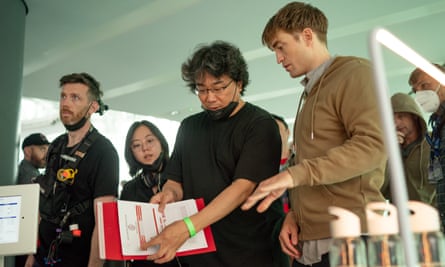
It is sometimes suggested that Bong Joon Ho’s work can be divided into two categories: the darker, more cerebral Korean-language films (Memories of Murder, Mother, Parasite), and the broader, more wacky English-language ones (Snowpiercer, Okja and now Mickey 17). But Bong says his language choice is more practical than that: “Snowpiercer is about the last survivors of humanity on a running train. And it would be really strange for the last survivors to only be South Korean and North Korean.” As for the strand of offbeat humour? That’s just how he is: “I think I’m really good at throwing people off; like it’s funny, but uncomfortable at the same time. I’ve heard responses like that to Parasite. They want to burst out laughing, but they feel a bit afraid of seeming rude. I think that’s just my sense of humour, even in my day-to-day life.”
Does that explain Tim Key in a giant pigeon suit? The British standup, Alan Partridge sidekick and increasingly prolific film actor turns up in Mickey 17 as “this weird cheerleader-mascot-third-rate entertainer” known as Pigeon Man. “I’m so happy you asked about Tim!” Bong says, clapping his hands together in delight. “You’re the first person to ask about him!” Bong had never heard of Key until he was suggested by their UK casting director, but soon recognised a kindred spirit. “I found him so funny, smart and creative. I really wanted him to improvise a lot for the film. Early on, he gave us the book of poetry that he wrote, and I just thought it was one of the most amazing things I’d ever read.”
So while Robert Pattinson may be Mickey 17’s “nucleus”, it’s in Key that the film’s spirit resides. For all its bleak prognostications about climate collapse and humanity’s future, there is a Pigeon Man-like absurdist optimism that persists. “We all know that things are just getting worse and worse. I know it, you know it, everyone knows it. We keep seeing incredibly advanced technology come out, AI and everything, but so much fear and anxiety surrounds that too.” The film’s primary goal was to express this, he says. “But at the same time, I wanted to show that amid such anxiety, fear and pessimism, people like Mickey – just, y’know, everyday people – somehow get through.”
Be it the love of a good woman like Nasha, a new book of bizarre poems, or the prospect of going to see Bong Joon Ho’s latest film at the cinema, we find reasons to dive back into the incinerator and reprint once more. “That’s a piece of optimism amid the suffering that I wanted to ultimately deliver,” Bong says. And, believe it or not, he’s still smiling.
Mickey 17 is in cinemas on 7 March.
Source: theguardian.com















